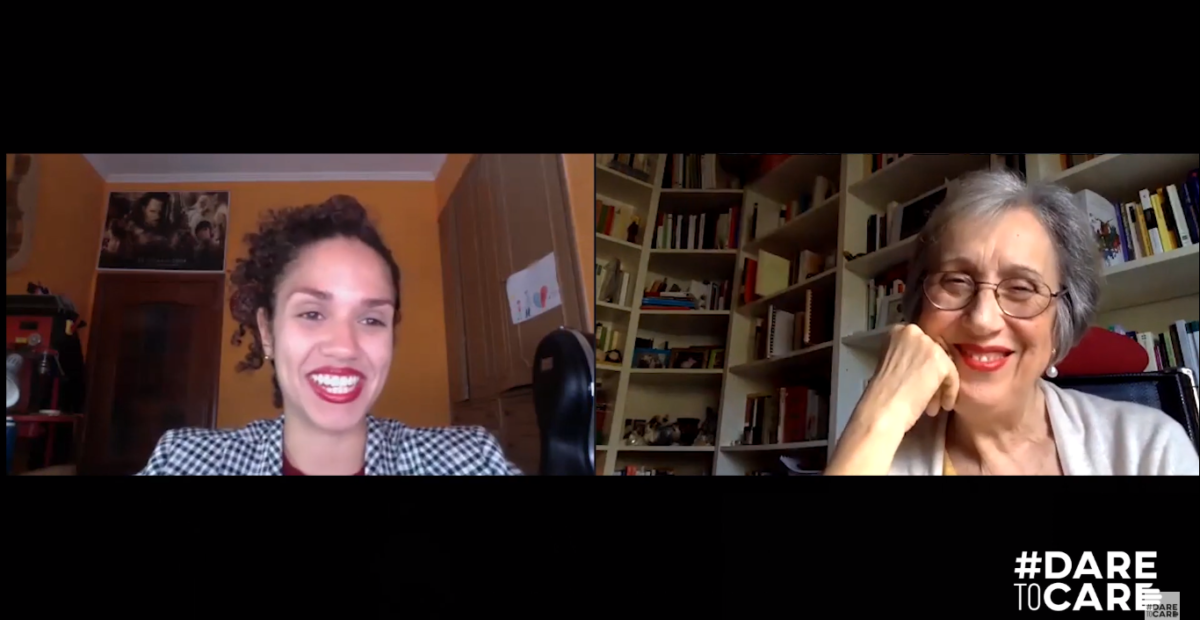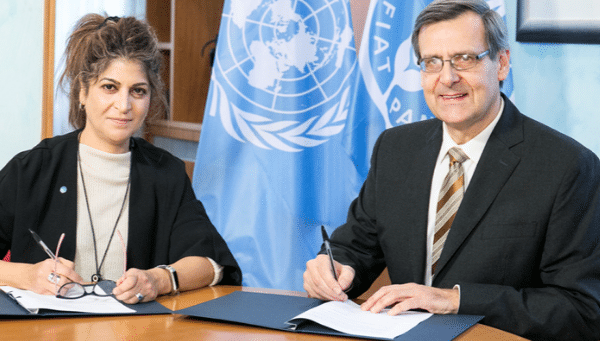
Watch
#daretocare: educare alla democrazia

Di Melissa Santos
In occasione del lancio di #daretocare, Pathway 2020-2021, Melissa Santos ha intervistato, per United World Project, Elena Pulcini, professore ordinario di filosofia sociale presso il Dipartimento di Filosofia dell’Università di Firenze, autrice del libro “La cura del mondo: paura e responsabilità nell’età globale”.
Trascrizione dell’intervista:
MS: Ciao a tutti e tutti, siamo qui con la professoressa Elena Pulcini ordinario di filosofia sociale presso il Dipartimento di Filosofia dell’Università di Firenze. Benvenuta professoressa. Grazie di essere qui con noi oggi.
EP: Grazie a voi con piacere.
MP: Per molti anni lei si è dedicata a questo tema della cura come ricercatrice. Queste esperienze di pandemia che stiamo vivendo. Che impatto ha avuto sulla sua visione della cura?
EP: Allora, a me sembra che sia emersa soprattutto una immagine di cura come assistenza. Pensiamo a tutto appunto il personale medico e sanitario se ne parlava moltissimo e così via. E questo ha risvegliato devo dire anche elementi positivi, cioè passioni un po’ dimenticate come la gratitudine, per esempio, oppure la compassione, oppure ancora, cosa forse più importante, il sentimento della nostra vulnerabilità.
Tutto questo è stato positivo perché ce n’è molto bisogno, diciamo, no? C’è bisogno di risvegliare quelle che io chiamo le passioni empatiche. Però, allo stesso tempo la cura è rimasta un po’ chiusa dentro una accezione essenzialmente assistenziale quella che in inglese si chiama ‘cure’, no , e non ‘care’. Allora, il mio invito è: la cura deve essere soprattutto “care”. E questo vuol dire che la cura deve diventare una forma di vita.
Noi la dobbiamo considerare l’applicazione pratica del principio responsabilità, cioè quello che noi facciamo dal momento in cui riconosciamo la nostra responsabilità, dunque è impegno, impegno pratico, è quotidianità ed, è infine, partecipazione emotiva, perché non c’è buona cura, senza un coinvolgimento di tipo emotivo e di tipo affettivo.
MP: A noi piace sognare una società in cui la cura sia l’asse portante dei sistema politici locali e globali. Secondo lei è utopia oppure realizzabile.
EP: Allora, sicuramente appunto la cura significa rispondere a. No? In questo caso si collega al concetto di responsabilità, l’idea di responsabilità, che vuol dire rendersi conto dell’esistenza dell’altro. Dal momento in cui mi rendo conto dell’esistenza dell’altro e non sono chiusa dentro il mio, diciamo, individualismo… Beh tutto questo produce cose perché, di fatto, rendersi conto dell’esistenza dell’altro significa recuperare una capacità che noi abbiamo dentro di noi che è l’empatia.
Empatia vuol dire mettersi nei panni dell’altro, è una capacità che noi abbiamo ignorato, che abbiamo trascurato, e che adesso è davvero il momento di fare emergere perché è dentro di noi. Il problema diciamo alla domanda che io mi sono posta e continuo a pormi è: ma chi è l’altro oggi? Credo che questa in questo momento sia una domanda importante perché per l’appunto stanno emergendo ormai da tempo nuove figure dell’altro, perlomeno nuove figure di quello che noi consideriamo l’altro significativo per noi. Perché tutto è cambiato perché tutto sta cambiando e siamo di fronte a sfide globali. Allora, l’altro oggi è anche il diverso, l’altro sono anche le generazioni future. L’altro, mi spingo fino a dire, oggi è la natura, l’ambiente, la terra che ci ospita.
Dunque, la cura diventa davvero la risposta complessiva alle grandi sfide del nostro tempo, se noi la sappiamo cogliere e se noi la sappiamo ritrovare attraverso questa capacità empatica di relazionarsi all’altro. Dunque, io non so se sia davvero realizzabile ma penso che non possiamo perdere la prospettiva utopica. Io credo che senza ideologia ma dobbiamo conservare un atteggiamento anche utopico, e questo vuol dire che non basta la responsabilità, c’è bisogno anche di coltivare la speranza.
MS: Quale suggerimenti può darci per agire in tale senso e orientare alla Cura le nostre società, a partire dalle istituzioni?
EP: Sì allora, io credo che dobbiamo agire in tutti i luoghi in cui noi operiamo, per far uscire la cura dall’ambito ristretto della sfera privata in cui è stata confinata per secoli e, come ormai ben sappiamo, identificata con le donne, che però sono state penalizzate perché sono state chiuse nel privato.
Quindi bisogna far uscire la cura dalla sfera privata. Io mi devo pensare come un soggetto di cura nella mia famiglia, nella mia professione di docente, quando incontro il povero emarginato nella strada o quando vado a fare il bagno su una spiaggia, in una spiaggia, devo prendermi cura di tutte le mie dimensioni.
Che non vuol dire essere soggetti di cura 24 ore su 24 perché questo sarebbe insostenibile. Noi non dobbiamo sentirci costretti alla cura, dobbiamo sentirci spinti alla cura e dunque vuol dire adottare la cura come una forma di vita cioè. Qualcosa che è capace davvero di interrompere questa spirale perversa questa deriva, diciamo, del nostro individualismo illimitato, che ci sta portando alla, non solo all’autodistruzione dell’umanità, ma alla distruzione del mondo vivente. Questo sarebbe veramente un gran peccato, mettiamola così.
Dunque, dobbiamo cercare di rispondere con la cura alle patologie delle nostre società. Il che vuol dire, in una parola, educare alla democrazia. Io ho molto amato un filosofo dell’ottocento che secondo me è insuperato su questo si chiama Alexis de Tocqueville il quale diceva ‘dobbiamo educare la democrazia’ è una lezione ancora tutta da imparare e credo che questo significhi coltivare le proprie emozioni epatiche in modo da essere spinti stimolati. Portati alla cura con piacere. Con gratificazione, non con costrizione.
MP: Bellissimo, perfetto. Grazie Professoressa della sua profondità e si vede che stiamo intraprendendo un percorso che può portare un nuovo stile di vita un nuovo orientamento culturale al mondo. Auguriamoci di riuscirci allora grazie mille.
EP: E’ quello che speriamo! E tanti auguri per il vostro progetto.
MS: Grazie mille, grazie mille.

Watch
#daretocare: educate to democracy

By Melissa Santos
On the occasion of the #daretocare pathway 2020-2021 launched by United World Project, Melissa Santos interviewed Elena Pulcini, Professor of Social Philosophy at the Department of Philosophy, University of Florence, and author of the book “La cura del mondo: paura e responsabilità nell’età globale”.
Transcript of the interview:
MS: Hi everyone, I’m here with Elena Pulcini, a professor of social philosophy at the Department of Philosophy at the University of Florence. Welcome, professor. Thank you for being with us today.
EP: Thank you, I’m happy to be here.
MS: Let’s start. You have dedicated your research to the theme of care for many years. Then came the experience of the pandemic that we are going through. What impact did it have on your vision about care?
EP: It seems to me that an image of care as assistance has emerged above all. Let’s think about all the medical and health care staff we talked about. And this has awakened positive feelings; passions that are somewhat forgotten, such as gratitude, for example, or compassion, or, perhaps more importantly, the feeling of our vulnerability.
And this was very positive because we are in great need of these, right? There is a need to awaken what I call empathic passions. At the same time, though, care remained a little closed within an essentially assistance-related meaning, what in English is called ‘cure’, and not ‘care’. So, I call for care to be above all “care”. This means that care must become a life form.
We must consider it the practical application of the principle of responsibility, that is, what we do from the moment we recognize our responsibility, so it is commitment, practical commitment, it is everyday life and, finally, it is emotive participation, because there is no good care without emotive and affective involvement.
MS: We like to dream of a society in which care is the backbone of local and global political systems. Is it a utopia or is it possible?
EP: So, care means responding to, right? In this case, it relates to the concept of responsibility, to the idea of responsibility, which means realising the existence of the other. From the moment I realise the existence of the other and I’m not locked in my, let’s say, individualism… Well, all this produces things, because, in fact, to realize the existence of the other means to recover a capacity that we have inside us, that is empathy.
Empathy means putting oneself in the other’s shoes, it is a capacity that we have ignored, that we have neglected, but now it is really the time to bring out because it is within us. The question I have asked myself and continue to ask myself is: who is the other these days? I believe that this is an important question at the moment because new figures of the other have been emerging for some time now, at least new figures of what we consider the other to be significant for us. Because everything has changed, everything is changing and we are facing global challenges. So, these days the other is also the different, the other is also the future generations. I would even say that today the other is nature, the environment, the Earth that hosts us.
Therefore, care really becomes the overall response to the great challenges of our time, if we know how to grasp it and if we know how to find it through the empathic capacity of relating to the other. So, I don’t know if it’s really possible, but I think we can’t lose the utopian perspective. I believe that without ideologies, but we must maintain an attitude that is also utopian, and this means that responsibility is not enough, we also need to cultivate hope.
MS: What suggestions would you give us to act in this sense and to orient our societies towards Care, starting with the institutions?
EP: I believe that we must act everywhere where we operate, in order to get care out of the restricted field of the private sphere in which it has been confined for centuries and, as we now know, identified with women, who, however, have been penalised, being closed in the private sphere as well.
So, we need to get care out of the private sphere. I have to think of myself as a caring subject in my family, in my teaching profession, when I meet the marginalized poor in the street or when I go swimming to the beach, I have to care in all dimensions.
It does not mean I have to be a caring subject 24 hours a day, because that would be unbearable. We must not feel forced, but inspired to care and therefore it means adopting care as a life form, that is, something that is really capable of breaking this perverse spiral, this drift of our unlimited individualism, which is leading us to not only the self-destruction of humanity, but to the destruction of the living world. That would be a real shame, let us put it that way.
Therefore, we must try to respond with care to the illnesses of our society. Which means educating democracy. There is a philosopher of the nineteenth century I really like, who is unrivalled in this topic, his name is Alexis de Tocqueville, who said that ‘we must educate democracy’, it is a lesson still to be learned and I believe that this means cultivating one’s own empathetic emotions to be stimulated. To take pleasure in care. Through gratification, not constraint.
MS: Great! Thank you, Professor for your profound answers, and as you see, we are beginning a pathway that can bring us to a new lifestyle and a new cultural orientation to the world. Let’s hope we can do it, then, thank you very much!
EP: That’s what we are hoping for! And all the best for your project.
MS: Thank you, thank you very much.







